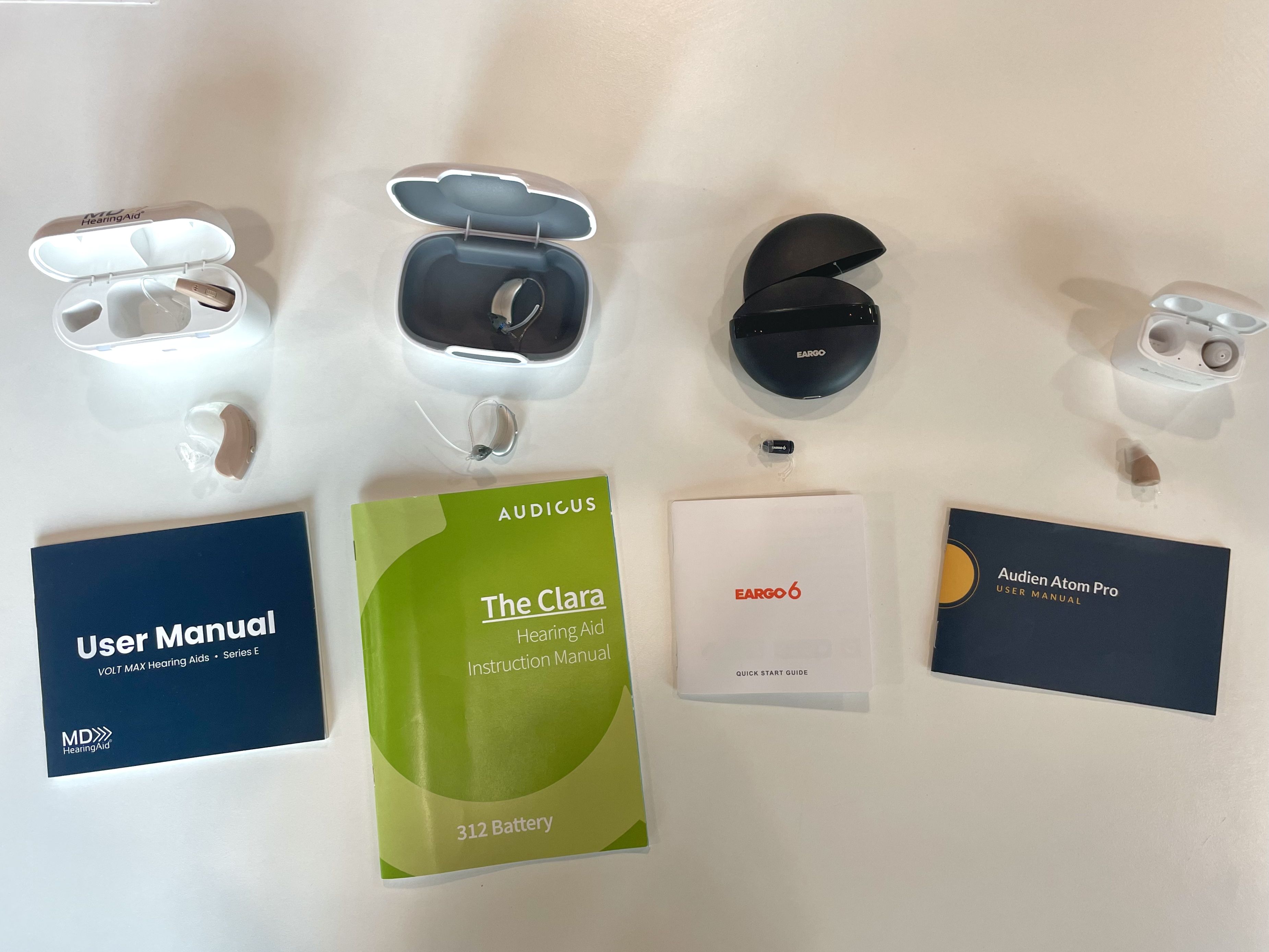How Will Over-the-Counter Hearing Aids Be More Affordable?
Aside from eliminating the need for prescriptions from audiologists, OTC hearing aids will continue to be regulated by the FDA as medical devices with less strict regulations than prescription hearing aids. While prescription hearing aids are classified as medical devices in healthcare, the OTC hearing aid market’s fewer specific regulations for performance requirements and device design are expected to attract more tech companies to the production process. OTC hearing aids still, however, have to meet certain design and performance standards, such as having user-adjustable volume control and a limit on their insertion depth into the ear canal and maximum sound output. OTC hearing aid manufacturers are also required to simplify phrasing in their labeling and user manuals.
Sony, one of the world’s largest manufacturers of consumer tech products, has announced its partnership with the hearing aid manufacturer WS Audiology to sell OTC hearing aids. With fewer governmental hurdles, more companies that specialize in tech will likely invest in producing hearing aids, which should increase competition to offer hearing aids with better technology at lower prices.
Another reason OTC hearing aids will be more affordable is consumers won’t have to pay for the added services typically bundled into the device costs of prescription hearing aids. Often, when you purchase hearing aids, you’re paying for the devices and a package of services that include evaluation costs, follow-ups, and adjustment fees at a flat rate, regardless of how much or little you use those services. Additionally, prescription hearing aid manufacturers and retailers can limit access to the software used to adjust these hearing aids so that when you need your hearing aids adjusted, you’re limited to only the hearing clinics that have software access and to whatever price they decide to charge for their services. Fewer hearing clinics with access means less competition and potentially higher prices for services.
How much is the OTC Hearing Aid Act projected to lower the cost of hearing aids?
- According to GoodRx Health, out-of-pocket costs for prescription hearing aids can range from $2,000 to $7,000 a pair.
- In an interview with Sarah Lundstrom, Au.D, she stated the FDA’s new ruling is unlikely to affect the costs of prescription hearing aids; federal officials estimate that the price of OTC compared to prescription hearing aids will lead to a savings of $2,800 per pair.
- The American Academy of Audiology, however, projects OTC hearing aids will cost between $600 and $1,200 a pair.
- Finally, Sarow gave us slightly less optimistic projections at $800 to $2,000 a pair.
How Do Over-the-Counter Hearing Aids Differ From Direct-to-Consumer Hearing Aids Already on the Market?
OTC hearing aids will be the first to follow the FDA’s latest regulations, but in practice, they aren’t the first hearing aids sold outside of a hearing clinic without a prescription. Direct-to-consumer (DTC), FDA-registered brands, like Eargo, Jabra Enhance, and MDHearing, have been selling hearing aids online for the past several years. So, what’s the difference between OTC hearing aids and DTC hearing aids? OTC hearing aids will follow the FDA’s formalized guidelines.
“Prior to the OTC law…it was legal to sell hearing aids directly, either through the mail or online, without the need for a licensed pro, hence, DTC brands like ours,” said MDHearing’s CEO Doug Breaker. “It was NOT legal to sell in retail. The OTC law gets rid of DTC case law and replaces it with one national law. OTC allows direct sales and retail sales, both without the need for a licensed professional.”
In addition, Eargo’s CEO, Christian Gormsen, said, “Brands like Eargo…have sold direct to consumers without an exam or prescription for a few years. In both cases, the brands operated in a gray area and worked directly with the FDA to clear their claims. The new FDA ruling essentially takes unspoken rules that have developed over time and formalizes them into something that will allow for new players to innovate with clarity.”
While other hearing aid brands that you buy in stores such as Costco instead of at your traditional hearing clinic may appear to be OTC, Sarow explained that those hearing aids still require a hearing test and software to fit them according to your hearing prescription.
The majority of DTC hearing aid manufacturers will comply with FDA regulations for OTC hearing aids, allowing their devices to be sold directly to consumers in retail stores and online. The FDA lists which OTC hearing aid brands are FDA-registered.
Over-the-Counter Hearing Aids vs. Prescription Hearing Aids: Pros and Cons
The FDA authorizes OTC hearing aids to treat only mild to moderate hearing loss (as perceived by the person experiencing it) in adults 18 and older. Children with any degree of hearing loss and adults with moderate to severe hearing loss will still need prescription hearing aids. As a reference, the National Institutes of Health describes hearing loss that’s potentially too severe for OTC hearing aids as trouble hearing conversations in quiet settings or missing loud sounds when driving, like cars honking at you.
Adults with mild to moderate hearing loss can purchase prescription instead of OTC hearing aids if they want custom-fit devices and services for adjustments from audiologists and hearing specialists. Adults who buy OTC hearing aids can still receive assistance from hearing professionals if they’d rather not adjust their hearing aids themselves or are having trouble using them.
Heather Malyuk, Au.D, head of audiology at Tuned, said one of the biggest pros of OTC hearing aids is that they bring “hearing care to the forefront of healthcare and general wellness” and give “access to affordable amplification.” She added, however, that a potential con comes into play “if consumers are not educated about the value an audiologist brings by helping assess or screen hearing, give recommendations, and help guide the consumer to the device that will best fit his or her needs and lifestyle.”
Although not required, some adults may wish to obtain a professional hearing evaluation before purchasing OTC hearing aids to confirm their type of hearing loss and get a professional’s recommendation, including which OTC brands they recommend.
In some cases, consulting with a hearing professional before purchasing hearing aids is important to rule out conditions other than age-related hearing loss. According to the American Speech-Language Hearing Association, consultation with a professional for prescription hearing aids may be more appropriate in the following situations:
- Hearing loss in only one ear
- Sudden hearing loss
- Ringing, roaring, or beeping in one or both ears
- Experiencing hearing loss after taking a medication associated with hearing loss
- Having taken chemotherapy or receiving radiation to the head and neck region
- Having constant ear pain
- Having frequent dizziness
The American Academy of Audiology also recommends that people with complex medical needs, such as cognitive deficits or limitations using their hands, seek care from an audiologist. They caution that people experiencing changes to their hearing may want to seek medical attention before purchasing OTC hearing aids to avoid missing conditions that may not respond to hearing aids, like ear infections, earwax impaction, or, more rarely, tumors of the auditory nerve.
Expectations of Consumers
By making OTC hearing aids easier to bring to market and more affordable, the hope is older adults with hearing loss will treat their hearing loss sooner. Early treatment of hearing loss in older adults is thought to decrease depression, anxiety, social isolation, and the likelihood of developing dementia.
However, although the price is a major barrier to buying hearing aids, it’s not the only barrier. People, including older adults, say there’s a stigma of being seen as old when wearing hearing aids. Some people in countries like Australia, Iceland, and Germany that offer free hearing aids paid for through public funds still refuse to wear hearing aids. Other hearing aid users complain they don’t like how hearing aids make things sound. Only time will tell how Americans will respond to OTC hearing aids, but at least hearing aids will be more accessible for those who want them.


